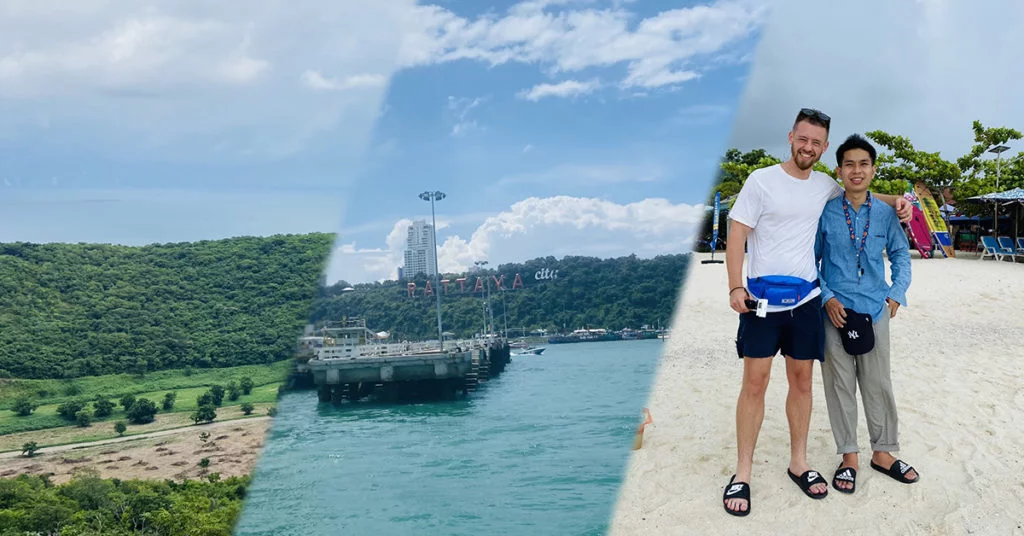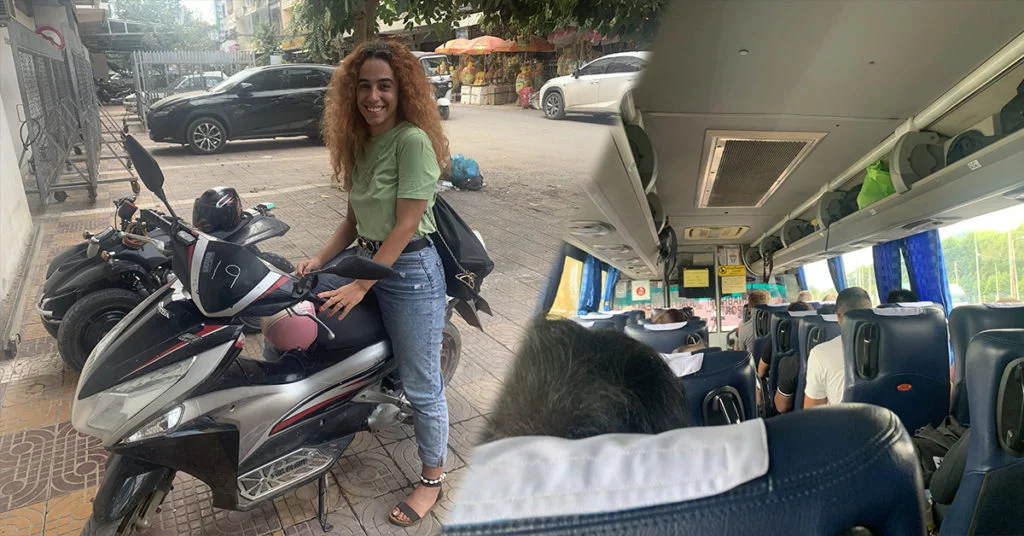Airbnb is a popular accommodation option for travelers, and, in Thailand, it’s no different. Airbnb provides access to everything from beachside villas to city-center condos. However, the platform’s legality in Thailand has been a subject of debate, causing confusion and concern among travelers. This article will answer the question, “Is Airbnb legal in Thailand?” in a quick (and comprehensive if you want it) manner, while also exploring safety considerations and alternatives.
Key Takeaways:
- Airbnb Legality in Thailand: Airbnb is legal to use in Thailand, but renting a residential flat for less than 30 days is technically illegal for tourists. While enforcement is sporadic, it’s important to be cautious when booking short stays.
- Safety Concerns: Staying in an Airbnb for less than 30 days can be risky due to potential legal issues and shady practices recommended by some owners. It’s advisable to explore safer alternatives, especially for short-term stays.
- Renting for 30 Days or Longer: If you plan to stay for 30 days or more, Airbnb can be a cost-effective option for short term rental. However, it’s essential to read descriptions carefully as some owners may charge extra for utilities.
- Airbnb vs. Hotel: Choosing between Airbnb and a hotel depends on the length of your stay and your preferences. Hotels are better for short stays, while Airbnb offers more affordability and amenities for longer-term stays.
- Safety in Airbnb: Airbnb is generally safe in Thailand, with secure properties and reviews available for reference. However, guests staying for less than 30 days should be cautious of potential legal issues, although the risk is low.
- Legal Risks of Renting Condos: Renting condos for short-term stays without a hotel license can lead to fines and legal trouble for both hosts and guests. It’s crucial to confirm the legal status of an Airbnb property before booking.
- Regional Variations: Airbnb regulations can vary by location in Thailand. While some places have stricter rules, enforcement may not always be consistent. Research and consider local regulations when booking.
- Alternatives to Airbnb: Consider alternatives such as traditional hotels, serviced apartments, guest houses, and hostels, depending on your budget and preferences. Each option has its pros and cons, so choose one that suits your needs.
Is Airbnb Legal in Thailand? (Condo & Rental)
Airbnb is completely legal to use in Thailand. What’s illegal is, an owner renting out a residential flat for less than 30 days. If you as a tourist are caught, or reported to the police, you can theoretically face a hefty fine. This usually doesn’t happen in practice, and the property owner takes the risk, but you should be careful when renting for less than 30 days.
Under Thailand’s Hotel Act of 2004, any properties that provide rooms for travelers for less than a 30-day stay, are considered hotels and need a hotel license. This is what makes renting Airbnb for less than 30 days illegal by Thai law, as most condos in Thailand do not have the hotel license necessary and wouldn’t be able to get it on a residential building.
When you walk into an Airbnb or condominium rental unit in Thailand, you will see posters everywhere that say staying for a night (or anything less than 30 days) is completely illegal and you can be reported to the police, face a fine, and even face imprisonment.
This seems pretty strict for only staying in a place for a night, but this is the law in Thailand. In practice, whether you get the police called on you is totally different. I have personally stayed in condos for less than a month before, and have seen many travelers do the same, nothing has ever happened.
(This was before I knew it was illegal and I’d already paid/booked them as you cannot refund these on Airbnb after).
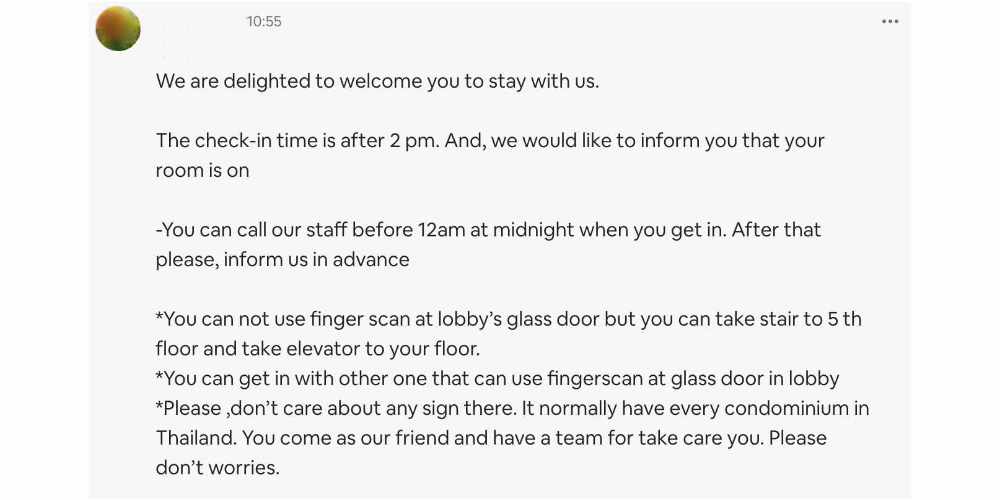
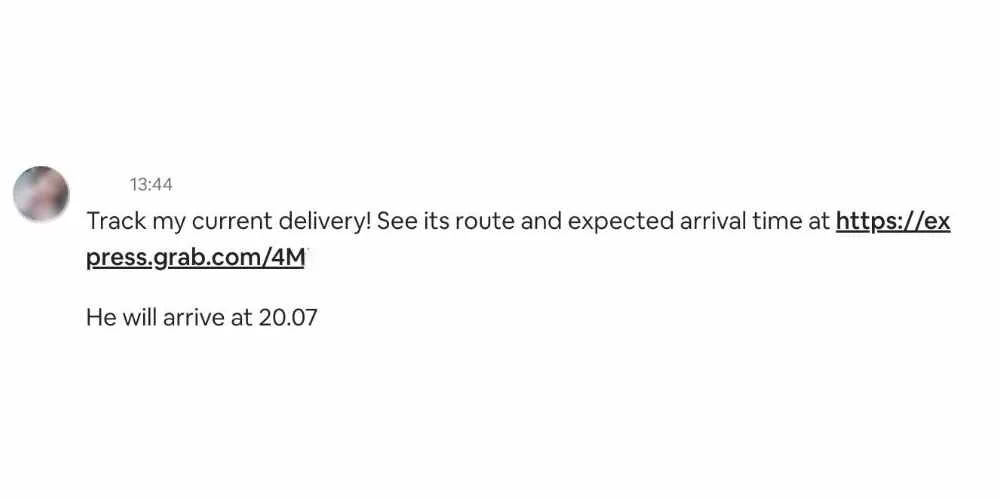
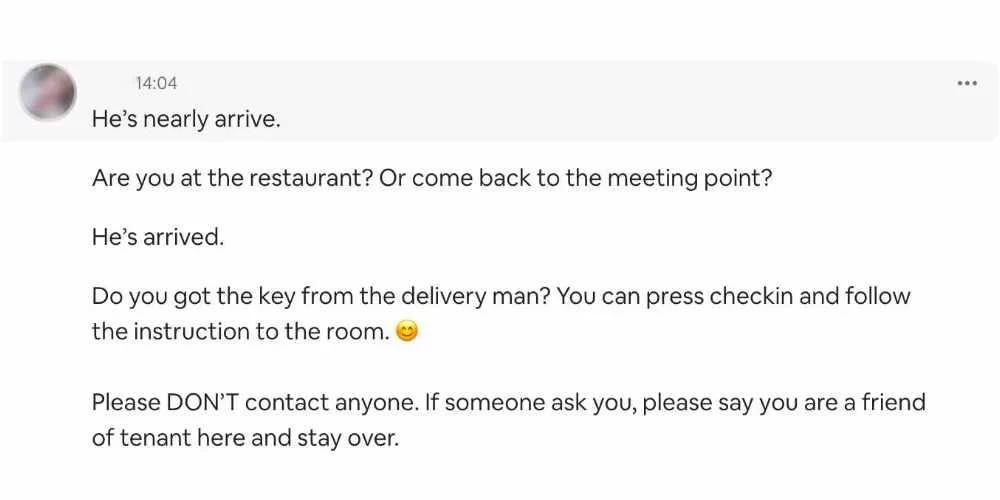
(click to enlarge images)
From my experience, I wouldn’t recommend staying in them as a tourist. There are better, serviced apartment options (often for lower prices) that have a real hotel license that allows you to stay there.
Staying in an Airbnb is also a little shady. Many of the owners will tell you to never use the fingerprint scanner and to get into the building using the carpark instead of the main door. They also tell you to not talk to the desk workers and to try to avoid them. If you are not loud, obnoxious, or stick out, you will likely be fine during your short stay, but we do not recommend it.
Additionally, you can’t check in immediately like with a hotel. To check in at an Airbnb you usually have to wait for:
- The condo owner to send you the key using Grab’s package delivery service
- Someone to come meet you outside and show you which rules to avoid breaking
If you are renting for 30 days or more, none of this is illegal. Renting on Airbnb for 30 days at a time is a great way to save money as well. But look at the description because some owners will charge extra/day for electricity, water, etc. This is usually not much.
Tips for Renting 30 Days or Longer
When renting for 30 days or longer, you should not book for a month before you go unless the reviews are fantastic. The pictures you see on Airbnb or Agoda/other hotel sites are not always what you get.
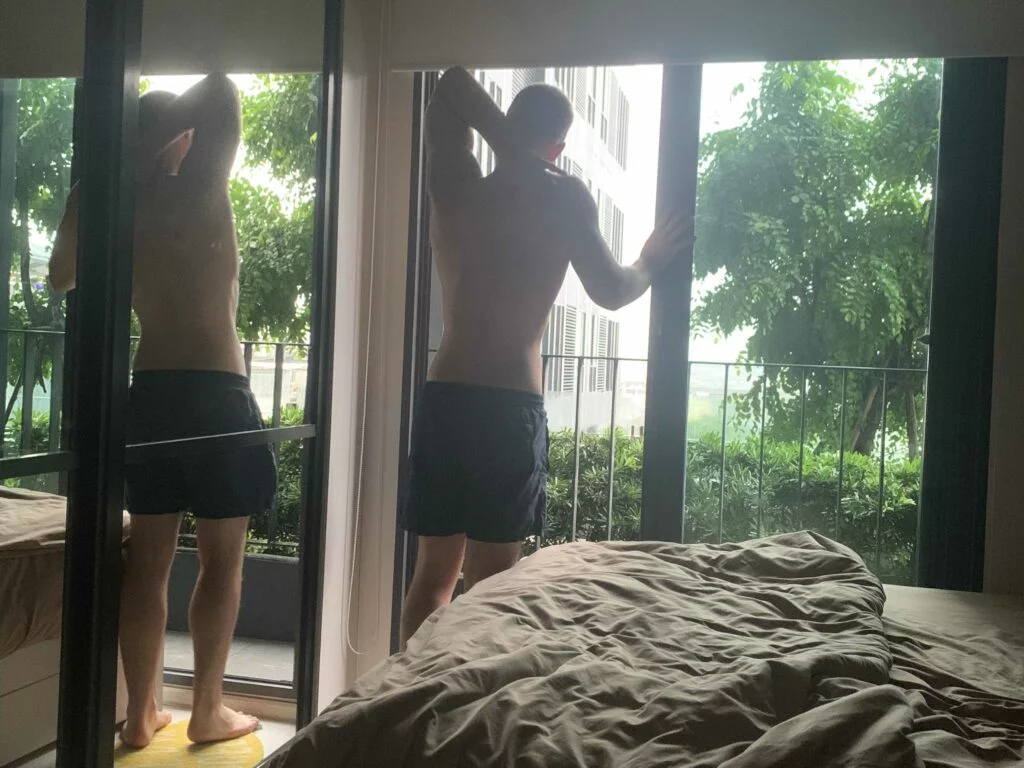
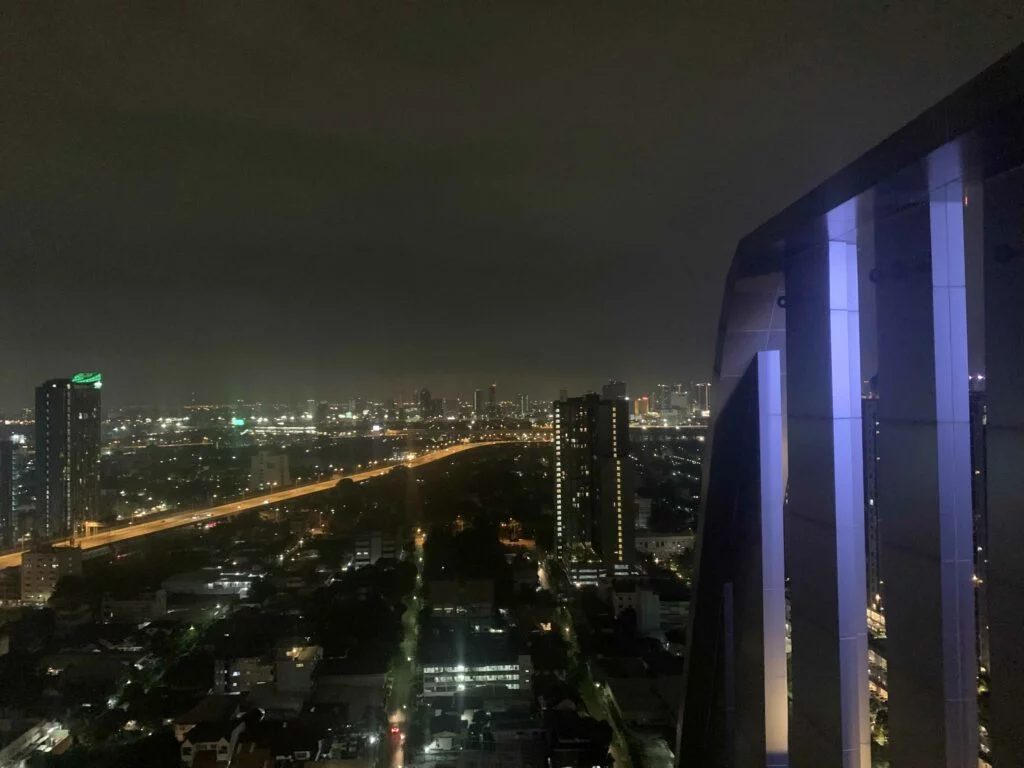
Sometimes I’ve turned up to rentals and there has been dirt on the walls, handprints (no idea how), bugs, and tonnes of dust after they said they had “cleaned it”. This is why I recommend staying for 1-2 nights to check the place out, check the area out, check that your neighbors aren’t loud, etc. Then, after you’ve scouted it out, you can book that place for a month.
You can usually sort this out with the owner after you’ve got their details because they don’t want to pay the fees that Airbnb charges, and you’ll additionally get a discount doing this. If you can’t stay there, the likelihood is that the owner will have other properties or know people who they trust and have other properties. I would still recommend viewing these before.
Make sure to include a little more budget for electricity, water bills, etc.
Airbnb vs. Hotel in Thailand
Choosing between Airbnb and a hotel can be a tough decision, and it’s not just about legality. Generally, a hotel is the better choice for shorter stays. They’re a lot more expensive and many don’t provide small kitchens like you’ll find in an Airbnb. However, in an Airbnb, you won’t get regular cleaning, you’ll have to take out your rubbish and treat it like it’s your own place.
If you’re staying for more than 30 days in one place it makes no sense to get a hotel or serviced apartment, they are far more expensive and aren’t suitable for long-term stays. However for short-term stays hotels are far superior. You don’t have to worry about security, or breaking the law, and you get great service. You also don’t have to tiptoe around the building or be afraid anyone will call the police, but the prices are a little more expensive.
Both have pros and cons and I’ll cover them below in depth
Pros for Hotel
- Room regularly cleaned, fresh towels, sheets etc provided in cost
- Don’t have to take rubbish out
- More secure for tourists
- You’re not breaking the law staying in one
- Generally closer to tourist attractions and points of interest
- Can check in 24/7
Cons for Hotel
- Much more expensive than Airbnb
- Not ideal for long-term rentals
- Doesn’t have a washing machine
Pros for Airbnb
- Much cheaper than a hotel (especially for monthly rentals and long term stays)
- Includes a kitchen, often a gym, and a rooftop pool
- Better for long-term stays
- Many include games rooms and working spaces
- MaxValu or convenience shop that is below the apartment building, also have some cool coffee machines
- Usually have a washing machine
Cons for Airbnb
- Can’t check-in 24/7
- Breaking the law & having to use shady ways to enter the building
- No cleaning or replacement of towels etc.
See our full, in-depth comparison article here – Hotel vs Airbnb Thailand
Is Airbnb Safe in Thailand? | Safety Concerns
Airbnb is safe in Thailand. Many are secure and have reviews you can check before staying. If you are staying for less than 30 days it’s not recommended as you might get reported by residents and face a hefty fine or even imprisonment.
The likelihood of this is very low, but it’s not completely unheard of.
One massive risk is a property raid. These are extremely rare, but they have occurred in the past.
If you’ve read a bit of history about Thailand, you’ll know it’s prone to military coups. The last one happened in 2014 and during this time we personally know someone who was raided, kicked out of the flat, had some of his items taken and they drained his entire Thai bank account of every last baht.
The likelihood of you being caught there during something like this is very low. However, if you’re staying long-term, it’s a big cause for concern. Whatever you do, don’t get a Thai bank account to store your money in, keep it all in your home bank account. Everywhere still uses cash anyway.
The Legal Risks of Renting Condos
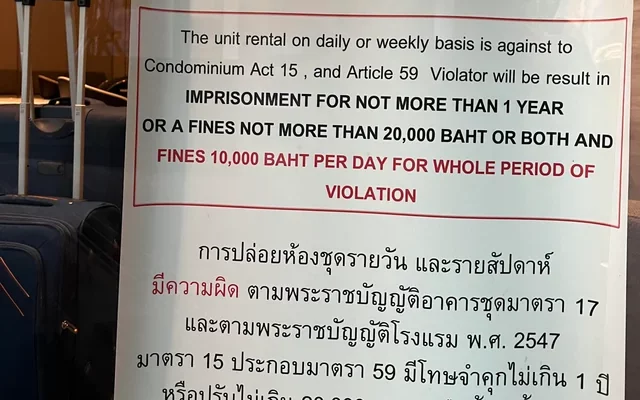
In many residential buildings, it’s illegal to rent out condos for short-term stays unless the property has a hotel license. Many condos even post signs warning against daily and weekly rentals, highlighting that fines may be imposed on violators. This applies not only to the Airbnb host but can extend to guests as well and more recently the condo signs have changed to say that guests are also liable to be punished if found.
Involvement of Authorities
As mentioned above, there have been instances where police have conducted checks or raids on condos operating as illegal short-term rentals. If caught, not only could the host face fines and other penalties but as a guest, you might find yourself in an unwanted legal entanglement that could disrupt your trip and potentially lead to fines or deportation.
Penalties and risks if caught renting illegal Airbnb in Thailand:
- Guests – potentially face eviction, fines, or even criminal charges in extreme cases. Always confirm the legal status of your Airbnb before booking.
- Hosts – fines, jail time, or both. However, as a traveler, your focus will be on avoiding properties that put you at such a risk.
Does Legality Differ From Place To Place?
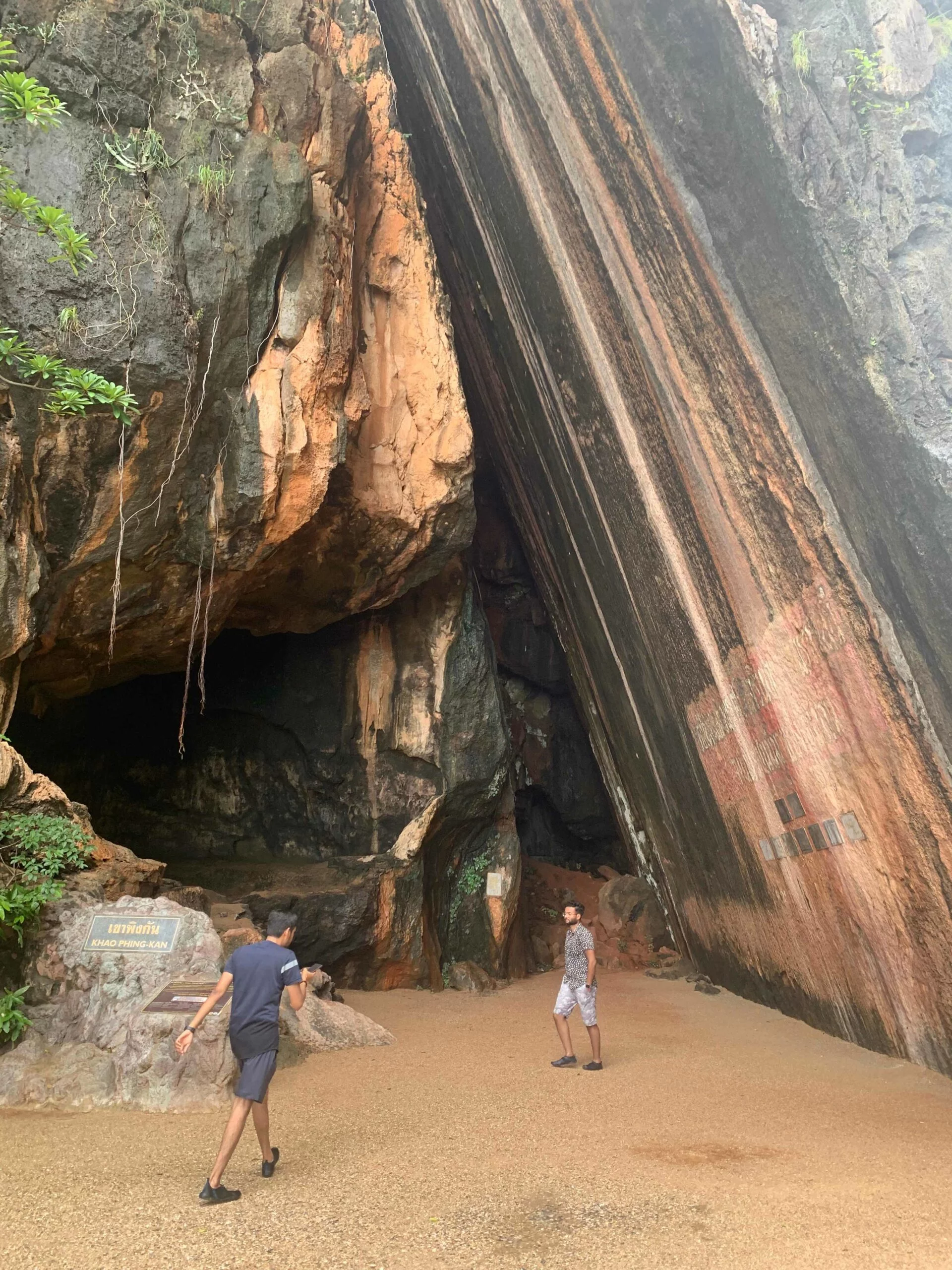
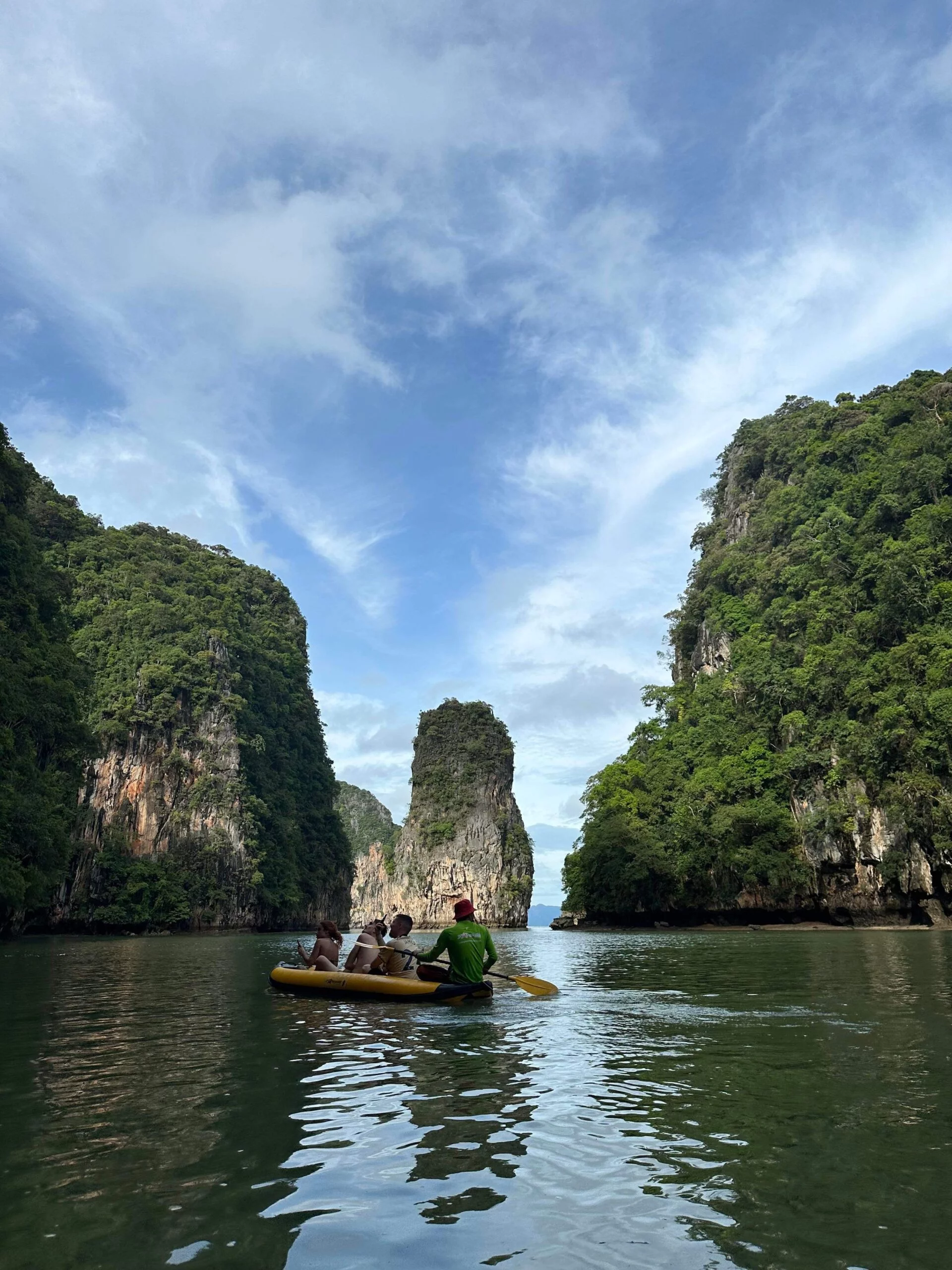
No legality does not change from place to place, it is illegal in Thailand for anyone to be operating a hotel business without a license, and by Thai law, using a condo as a holiday rental (anything less than 30 days) without a license can get a fine or jail term in prison for the owner and even the traveler.
You will still be able to book an Airbnb in Thailand and many condos on Airbnb’s website are available to rent. However, it is considered illegal.
Whether it is often enforced or not is another story. Many travelers stay in condomonium units and never have issues with doing so, but the Thai Police have raided buildings before.
I personally would not recommend you book them, but if you have already booked and are past your refund date, you should be fine staying there. When I stayed in the Airbnb rentals I booked before knowing about this law, there were no issues, just some pretty sketchy check-in requests like never scanning your fingerprint on the scanner or using the back doors to get into the apartments.
Airbnb’s business typically doesn’t refund you after the refund date is up, but in these cases they do. So if you’ve found out and already booked, you should be able to refund.
Bangkok
The capital city has the strictest regulations, with many condos outright banning short-term rentals. I’ve personally rented Airbnb’s in Bangkok and there was nothing that happened. Whether the owner was banned or fined I don’t know, but they still seem active on Airbnb and have their listing live, so I imagine everything is ok.
Pattaya
We had already pre-booked an Airbnb here which was non-refundable for the trip. The rules seemed relaxed here and we spoke to the owner who told us that no one checks or no one really cares about the rules there. They’re still in place and people can still be fined.
Phuket
Phuket has a slightly more relaxed environment but still requires that properties have a hotel license for short-term rentals too. We personally didn’t rent an Airbnb here but opted for a hotel instead. The hotel was much poorer quality for the price we could have spent on a nice apartment, but we were following the rules.
Chiang Mai
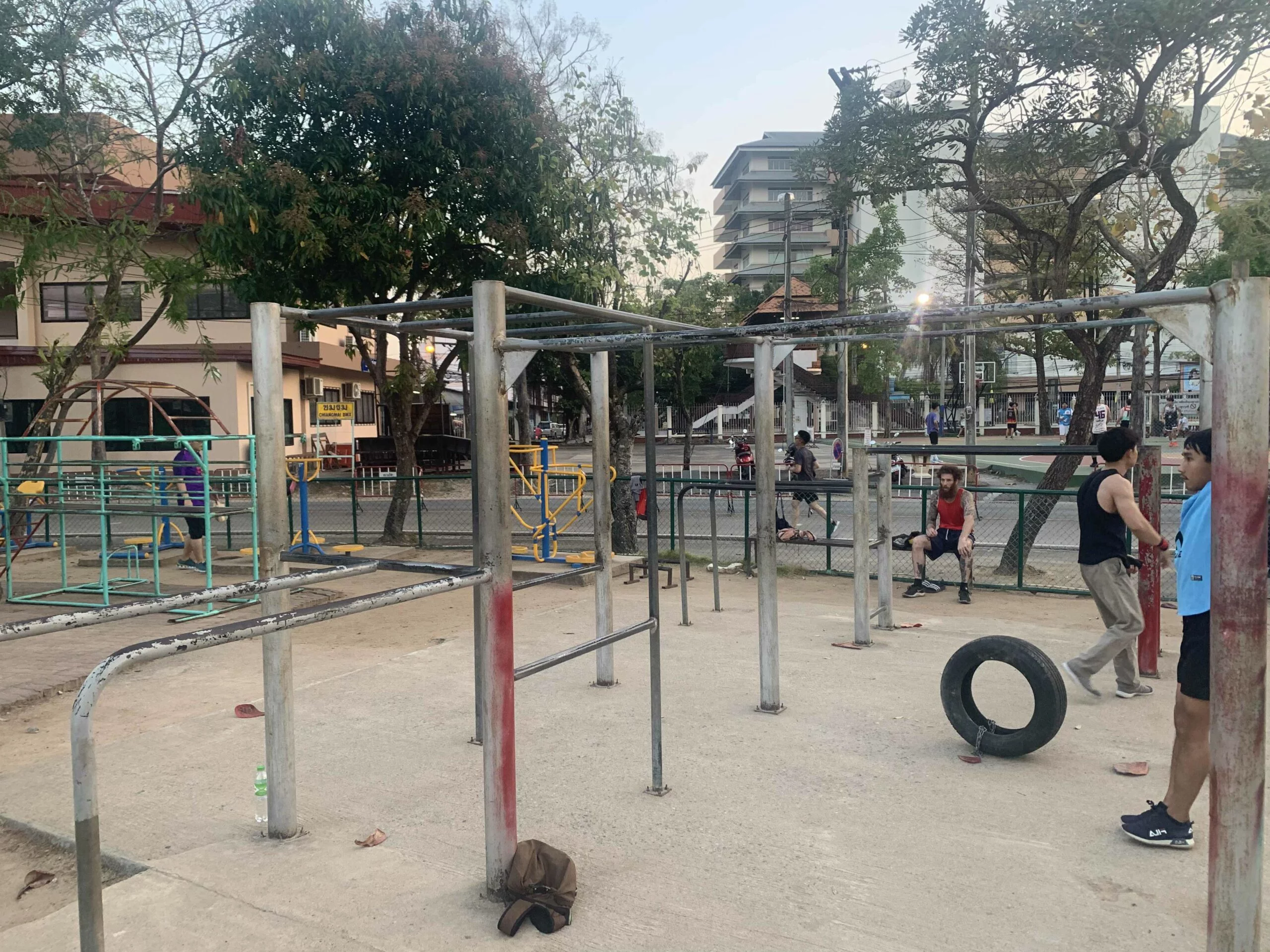
This northern city has a burgeoning digital nomad scene and thus, sees a more significant number of short-term rentals. However, the laws are just as strict here, if not more so due to the concentration of tourists. If you’re renting over 30-days you’ll be fine. I met many nomads in Chiang Mai who were doing this and nothing bad happened to them.
Airbnb Alternatives: What Are Your Options?
Traditional Hotels
Traditional hotels are fully licensed and offer less risk when it comes to legal troubles. They also often provide amenities like 24/7 reception, room service, and organized tours. You get clean towels, clean sheets, and a much safer experience in a hotel as you’re allowed to be there.
Top tip: book hotels on Agoda or Traveloka. These are apps like Booking.com or Hotels.com, however, offer much cheaper prices and points rewards. These apps are great to build up cashback and points during your stay in SEA if you’re traveling around long-term.
Serviced Apartments
There are many apartment-style stays available that have a hotel license. These are a lot more high-class and cost a lot more. You’ll be spending around $50/night in a well serviced apartment around Bangkok. If you’re staying for longer it’s better to use Airbnb. A great site to find serviced apartments is Agoda.
Guest Houses and Hostels
These are often more budget-friendly and are also licensed for short-term stays. Plus, they offer a more social atmosphere if that’s what you’re looking for. Guest houses can be a great budget option while providing a private room. Be careful with which guest house you pick though because the quality of these can vary widely. Some are amazing and some are really, really bad.
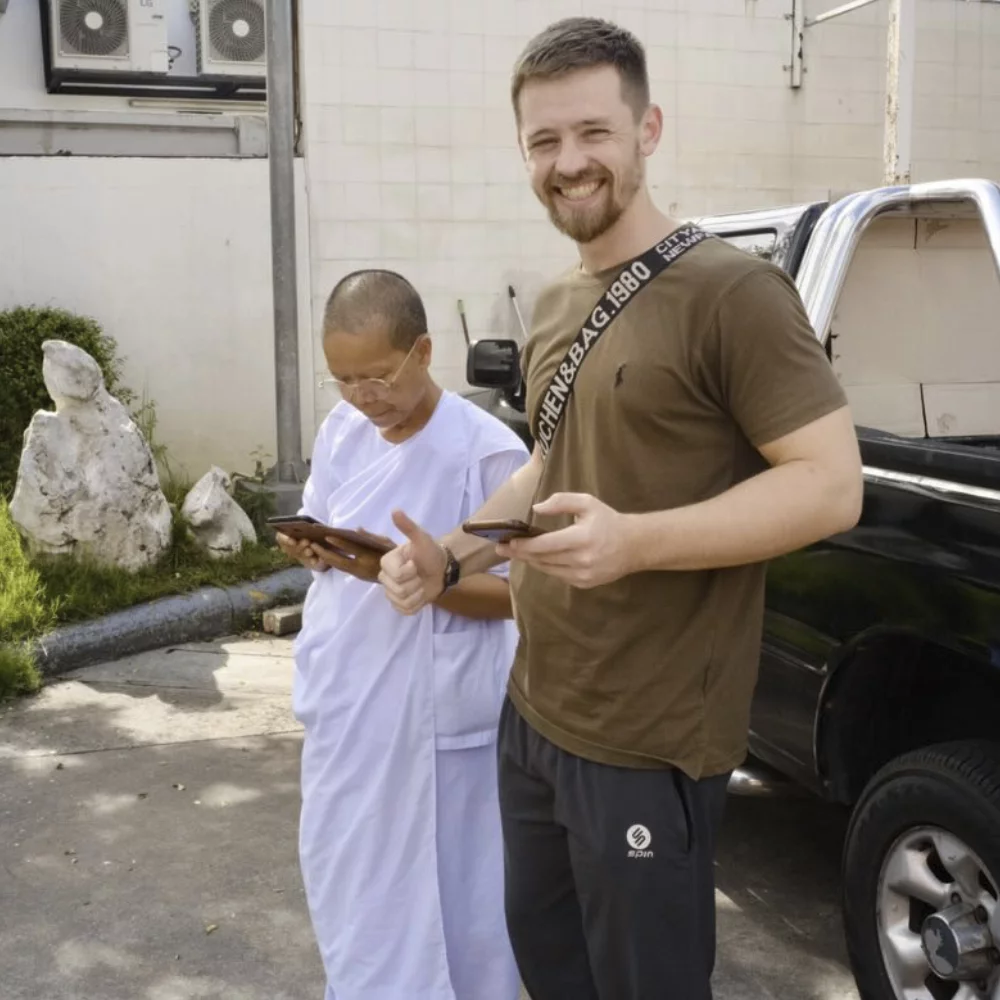
I’m Harry – and I was tired of the same old “10 best places I’ve never been but I’m writing about for some reason” blog posts. So… I’m a young traveller on a mission to travel the world and share my true, unfiltered experience, including all the gristly details. From packing my life into one bag for a year, to traveling Vietnam by motorbike, to sorting out Visas for specific countries – I’ve done it all, am doing it all and only give my advice on things I have done – not regurgitated cr*p from another source *cough* most publications *cough*. So bear with us! This project will take some time to grow, and will take a fair bit of money. But I’m determined to make it the single best source of information about traveling on the internet.
